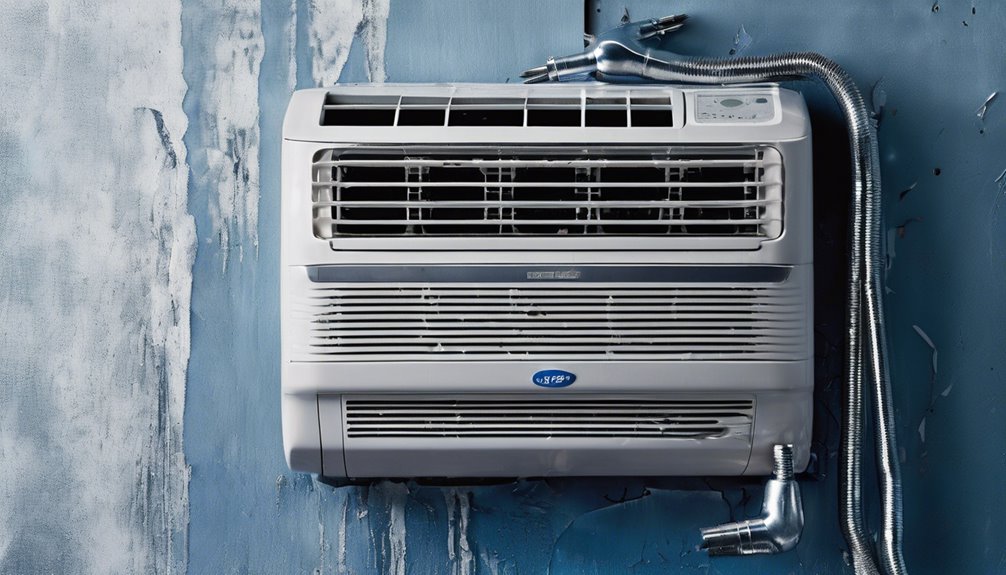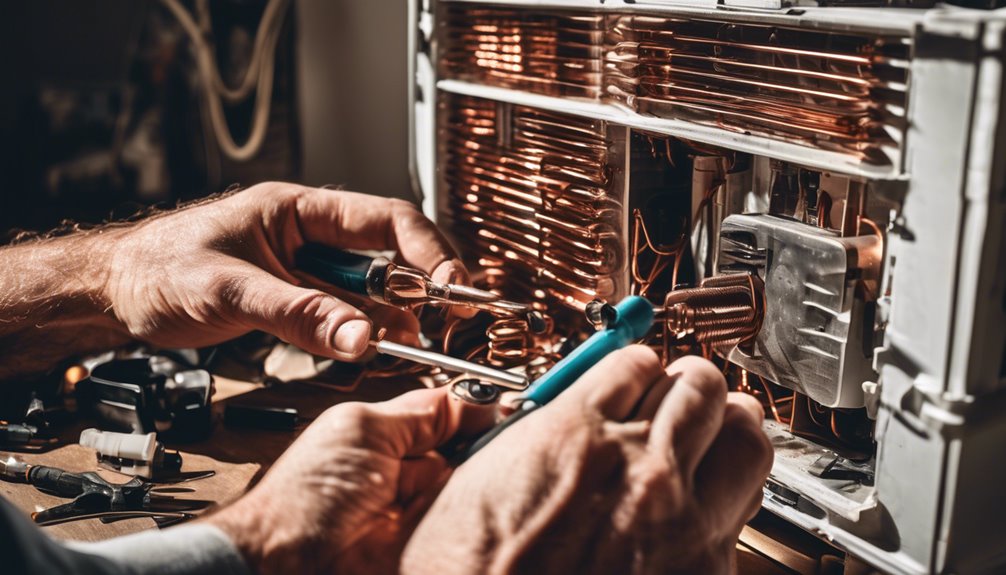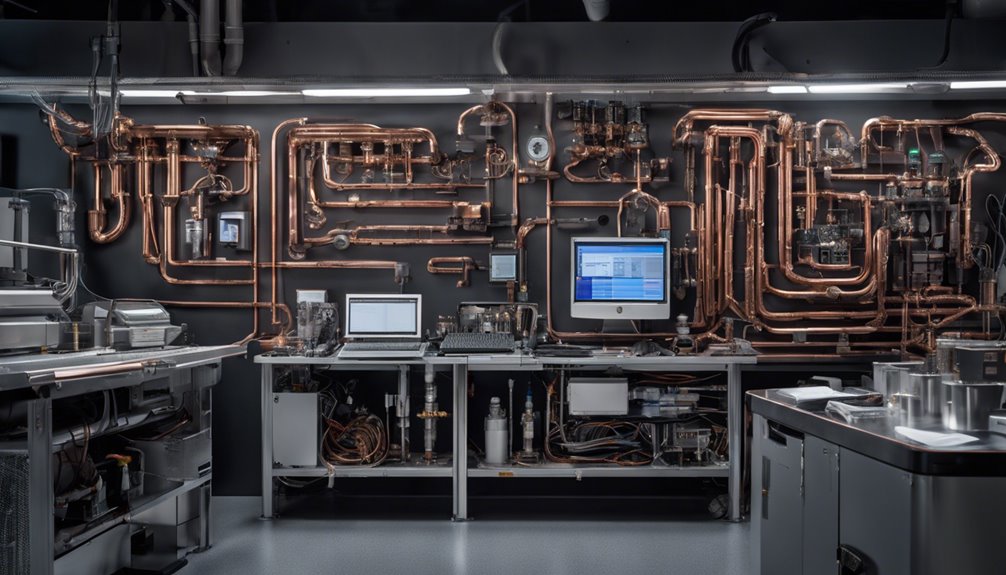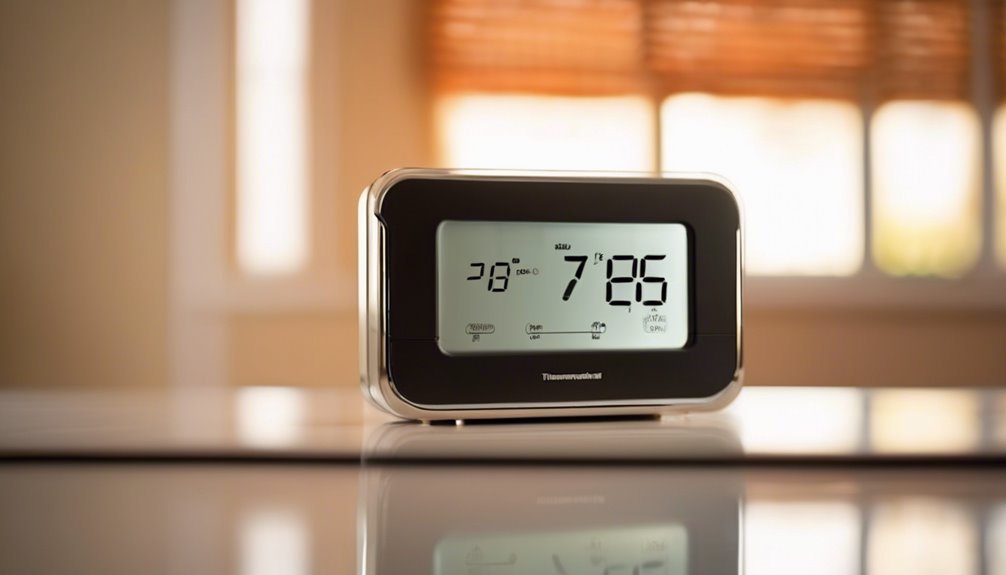To fix your noisy air conditioner, start by identifying the source of the noise, which could be a faulty installation or dirty air filters. Check if your unit is level, securely fastened, and if all screws and bolts are tightened. Clean or replace air filters, inspect internal components, and tighten loose parts. You'll also want to clean the condenser coils and lubricate moving parts. By following these steps, you'll be well on your way to a quieter AC – but there's more to explore to get your unit running smoothly and efficiently.
Key Takeaways
- Ensure proper installation and maintenance to prevent strange noises in your air conditioner, and consider hiring a professional if needed.
- Clean or replace dirty air filters monthly to reduce noise and energy bills, and opt for high-quality filters designed for your AC unit.
- Inspect and secure loose internal components, tightening screws and bolts without overtightening to prevent damage.
- Clean and balance condenser coils to reduce noise and energy bills, using a garden hose and gentle detergent for thorough cleaning.
- Lubricate moving parts and inspect belts for wear, following the manufacturer's recommendations to reduce friction and noise.
Identify the Source of the Noise
When your air conditioner starts making unusual noises, it's essential to identify the source of the problem to effectively fix it.
You'll need to perform a noise diagnosis to determine what's causing the racket. Check if the unit was installed correctly, as faulty installation can lead to strange noises.
Make sure it's level, securely fastened, and that all screws and bolts are tightened. If you're not comfortable with this process, consider hiring a professional to help you identify the issue.
Clean or Replace Air Filters
Dirty air filters can be a significant contributor to a noisy air conditioner, so it's essential you check and clean or replace them regularly.
You'll want to inspect your filters monthly, especially during peak usage. If you find dirty filters, clean them gently with a vacuum or replace them altogether.
Remember, filter quality matters, so opt for high-quality filters designed for your AC unit. Clogged filters force your AC to work harder, leading to increased noise and energy bills.
Inspect and Secure Loose Parts
After ensuring your air filters are clean, it's time to inspect your AC unit's internal components.
You'll want to look for rattling components that could be causing the noise. Check for loose screws, bolts, or other fasteners that may have come undone over time. Make sure all parts are securely tightened, but avoid overtightening, which can damage the unit.
Pay particular attention to the fan blades, motor mounts, and compressor components, as these are common culprits. If you find any loose parts, tighten them according to the manufacturer's instructions. This should help reduce the noise level and improve your AC's overall performance.
Check and Balance the Condenser Coils
You'll need to access the condenser coils, usually located on the outdoor unit, to inspect them for damage or dirt accumulation.
Dirty coils can cause your air conditioner to work harder, leading to noise and increased energy bills. Use a garden hose to gently spray the coils from the inside out, removing any debris or dirt.
For more thorough cleaning, use a specialized coil cleaning brush or a gentle detergent. Regular coil maintenance is crucial to ensure your air conditioner operates efficiently and quietly.
Neglecting coil cleaning can lead to reduced airflow, increased energy consumption, and even system failure. Make coil maintenance a priority to keep your air conditioner running smoothly and quietly.
Lubricate Moving Parts and Check Belts
Moving parts in your air conditioner, such as fan motors and compressor bearings, require regular lubrication to reduce friction and noise.
Without it, motor lubrication can break down, leading to increased friction and, you guessed it, more noise.
- Check your air conditioner's manual to see if it recommends lubricating specific parts, such as the fan motor or compressor bearings.
- Use the recommended type and amount of lubricant to avoid over- or under-lubricating, which can cause more harm than good.
- While you're at it, inspect the belts driving these moving parts for signs of wear, such as cracks or fraying, which can also contribute to noise and wear.
Frequently Asked Questions
Can I Fix a Noisy Air Conditioner on My Own?
You can try DIY troubleshooting to identify the source of the noise, and with some basic Aircon maintenance skills, you'll likely be able to fix it on your own, saving time and money on professional repairs.
How Do I Prevent Noisy Air Conditioner Issues in the Future?
To prevent future issues, you'll want to prioritize regular maintenance, starting with frequent cleanings and replacements of your air filter, which can greatly reduce the likelihood of noisy operation and prolong your AC's lifespan.
Will a Noisy Air Conditioner Increase My Energy Bills?
You're wondering if a noisy air conditioner will hike your energy bills. Yes, it likely will, since a noisy AC often indicates reduced energy efficiency, causing your unit to work harder and consume more power, with sound amplification being a sign of wasted energy.
Can a Dirty Thermostat Cause a Noisy Air Conditioner?
You might be surprised to learn that a dirty thermostat can indeed cause a noisy air conditioner. Dust accumulation on the thermostat can lead to faulty calibration, which can trigger unusual sounds from your AC unit.
Will a New Air Conditioner Be Quieter Than My Old One?
You'll likely find that a new air conditioner is quieter than your old one, thanks to modern designs that prioritize sound reduction. Look for units with low sound ratings, usually measured in decibels, to ensure a peaceful indoor environment.
Conclusion
You've made it to the end of the noisy AC saga! Now you've identified and fixed the source of the racket, cleaned or replaced filters, tightened loose parts, balanced condenser coils, and lubricated moving parts. Your AC should be humming along smoothly and quietly. If not, revisit the steps to ensure you didn't miss anything. With these simple fixes, you should be enjoying a peaceful indoor climate in no time!



